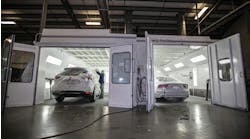Do you ever ask yourself, "Who is really running MY business?" Have you made business decisions based on fear? Do you ever feel like you're the "only one?" Do you sometimes wonder how this industry came to operate the way it does?
These aren't new questions, observations or problems. Some of the catch phrases may have changed, but I recall my folks talking about these things back in the 1970s as they worked to build a state association to help shop owners address things like this.
A trade association is just one of the ways we as individual shop owners can nurture camaraderie, affect change and interact with other forward-thinking and like-minded people in our profession. If you're not involved in something in the industry beyond your day-to-day shop operations, you are, in my opinion, contributing to the problems facing our trade.
I talked to Dan Risley shortly after he became the executive director of the Automotive Service Association earlier this year. Not surprisingly, Dan believes the best opportunity we as individual shop owners have to affect change in the industry is through membership in an association.
"As a national association, we have access to many of the decision-makers in the industry," Risley points out. "When an issue arises, we have the relationships to express concerns, recommend change and be the voice of our members. And because of the number of members we represent, we are often in a position to influence change."
The challenge, Risley said (and certainly one I've seen in over 25 years of membership in state associations), is that not all associations are active and effective — perhaps in part because not enough of us belong and because some shop owners belong only with a "What can you do for me?" viewpoint.
"If you are going to support a state and/or national association, you will find that the more engaged you are, the more value you derive from the association," Risly said. "You will help define the effectiveness and success of the association."
Associations are just one of the ways to realize you're not "the only one," and to make a difference in the industry. What if every shop in your market wrote estimates or repair plans as thoroughly as yours does? Wouldn't that help you get paid for operations that you're currently being told aren't "prevailing practice"? Wouldn't that reduce the chance you'll be told your severity is not competitive? I encourage you to work with other shops (or maybe a jobber) in your market to bring in estimating or other training for all shops in your area.
If you don't belong to a 20 group or other type of networking group for shops, reread my earlier column on this topic (abrn.com/20group). You will quickly reap benefits from this type of collaboration with peers.
Join an industry committee or board. You share your expertise and give back to the industry — and will just as often find you enhance your skills by doing so.
If you've ever been upset about missing or seemingly incorrect information in the estimating systems, you have a tool — the DEG (www.DEGweb.org) — to quickly address it. Take 3-5 minutes to enter an inquiry about a labor time or other aspect of the estimating database that seems wrong, and as you'll see that inquiry can often result in dramatic improvements to the systems.
Lastly, there's a way to interact with others in the industry and affect change that I think should be resurrected. Have you ever caught yourself cursing the proprietary software we use (often only because of insurer mandates) because it is clunky or glitchy? I think it's time to bring back "user groups" (like 3M had back when it had a shop management system) that allow shops using a system to talk about it and call for changes that will enhance the way it functions. I know the information providers each have an advisory committee (I've served on one), but if there are effective "user groups" out there, I don't know about them.
Let's add these groups to the ways we as individual shop owners can interact with others and bring about change.




